Global reach
Faculty members benefit from Fulbright Program's global visibility
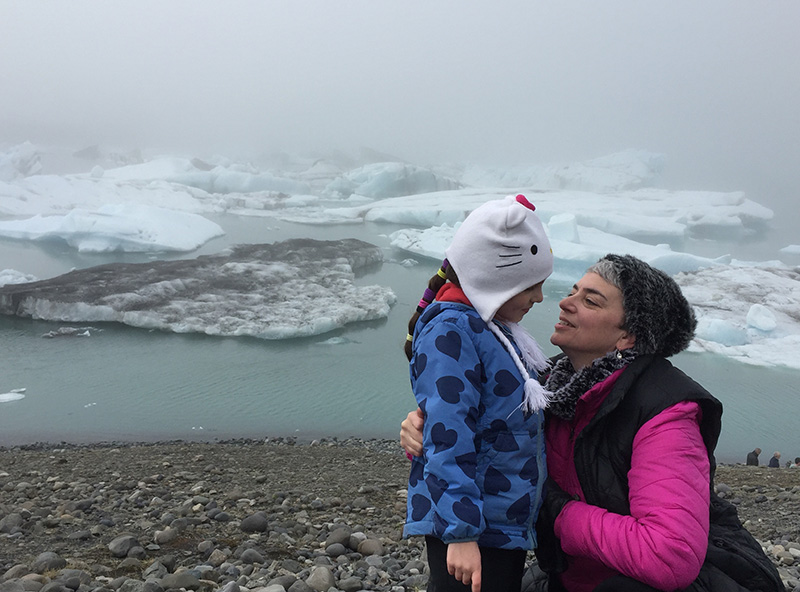
In 1945, Sen. J. William Fulbright of Arkansas introduced legislation to use funds from surplus war materials to support a new international educational exchange program dedicated to supporting peaceful relationships between the United States and other countries.
More than 380,000 scholars – approximately 8,000 per year – and 155 nations have participated in the Fulbright Program since then, relying upon its foundational spirit of international cooperation to address pressing global issues.
“The Fulbright Program is widely regarded as one of the most distinguished awards in the world and, to date, has produced more Nobel Laureates than any other government-sponsored program,” said Christopher Lukasik, Purdue’s Provost Fellow for Faculty Fulbright Awards and himself a two-time Fulbright grantee.
Former Provost Debasish “Deba” Dutta created Lukasik’s position in 2017 as part of a strategy to increase Purdue’s number of Fulbright faculty, and this year the University saw record-breaking results. Eight faculty members received Fulbright U.S. scholar awards for the 2019-20 academic year, the most ever for Purdue in a single year.
Included in that group is Wendy Kline, the Dema G. Seelye Chair in the History of Medicine, who continues the College of Liberal Arts’ substantial representation in the Fulbright Program.
“The College of Liberal Arts has historically been the top producer of Fulbright faculty at Purdue,” said Lukasik, who in addition to his role as Fulbright facilitator is an associate professor of English and American Studies. “It speaks not only to the world-class stature of CLA’s faculty, but to the College’s commitment to support the international scope of their teaching and research.”
In turn, Lukasik said Fulbright faculty return from their trips abroad better prepared to help their students take up global challenges like immigration, renewable energy, and food security and to make headway in a global economy. That was his experience after completing Fulbrights at the University of the Philippines and at the University of Graz, Austria.
“Both have impacted how I approach teaching and how I address any number of global issues in the classroom,” Lukasik said. “I wish every student at Purdue could have the opportunity to live in a developing country – not as a tourist, but as a resident – and experience how the majority of people on this planet live day to day. It will change how you think about so many critical issues our planet is facing.”
That goes for faculty, too.
In this issue, nine of the College’s most recent Fulbright grantees will describe how their experiences in the program enriched their personal and professional lives. Each faculty member shared stories of how the Fulbright is indeed a life-changing opportunity.
“I value it so much in so many ways that I can articulate, and in ways that I cannot put into words so easily – and I suppose the most important part of my Fulbright experiences lie so deep within me and are of such a vast nature that they cannot be summed up simply,” said TJ Boisseau, associate professor of women’s, gender, and sexuality studies and two-time Fulbright recipient.
“I would say the amount of intellectual growth that I’ve had from living abroad as a Fulbrighter, and also from other experiences living abroad going all the way back to my time as a college kid on a study abroad that required me to do my own independent comparative ethnographic research … well, these experiences certainly were as formative for me and for my growth as an intellectual as getting a Ph.D. in my field. I have no doubt about that.”
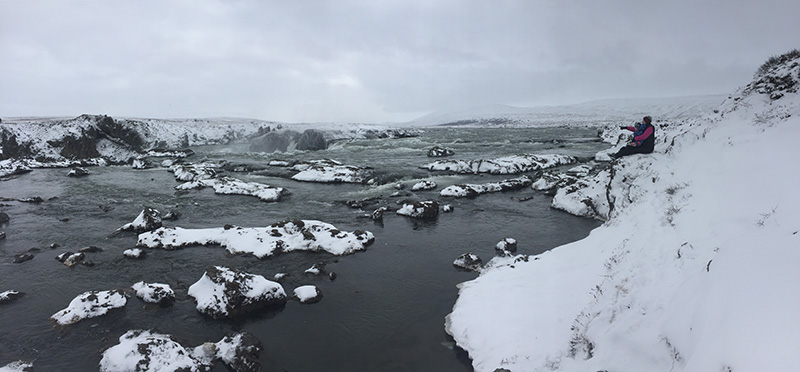
INTERNATIONAL IDEAS TJ BOISSEAU, INTERDISCIPLINARY STUDIES
When TJ Boisseau applied for the Fulbright experience she completed in the spring semester of 2017, she specifically wanted to teach at the University of Iceland.Her reason: The University of Iceland is set in a country that is on the forefront of multiple issues in Boisseau’s field of expertise and is home to an internationally renowned institute for gender equality studies.
“The United Nations University Gender Equality Studies Centre at the University of Iceland trains young activists seeking careers in public service in their home countries, primarily in Africa, the Middle East, and South Asia,” said Boisseau, an associate professor of women’s, gender, and sexuality studies. “This training provides an opportunity to hone the ideas about gender equality they bring to the program, or in some cases to conceive a brand-new understanding of what feminism means to them and might look like in an institutionalized setting and gives them a chance to think through how they might be a feminist agent of change in their own conflict-ridden, or war-torn, economically crisis-ridden society.
“That’s a mission that I was proud to contribute to. And, I’m interested in learning from other scholars who work on global feminisms.”
By participating in conferences in Iceland and other locations since her Fulbright trip, Boisseau has been able to develop connections with women’s studies administrators and directors around the world.
Meanwhile, the exposure to other viewpoints that the Fulbright trip provided has greatly impacted her teaching.
“Here at Purdue, I teach transnational feminist activism and global feminist movement in historical perspective, and certainly that was a great experience for invigorating my teaching with new perspectives. Very much so, I would say,” Boisseau said. “In terms of take-aways in specific, I got a ground-level view at what some have called the ‘NGO-ization’ of feminism, state-supported feminism, and market-driven feminism, in action.
“My graduate training was as a scholar of American women’s history, and only secondarily in Middle-Eastern women’s studies,” she continued. “And, although I have done historical research in archives located in Europe, the Middle East, and Africa, honestly, archival research does not always challenge one’s perspective since it is a fairly solitary endeavor and does not force one into conversations or collaboration with others. Having the experience of teaching feminist studies in an international context was incredibly eye-opening in lots of ways that will impact how I teach these subjects back home in Indiana, and how I do my own research, as well.”
This was Boisseau’s second Fulbright grant, after previously teaching in Germany at the University of Bayreuth in 2003-04. And like many of her Purdue colleagues who have completed Fulbright trips abroad, Boisseau said the cultural value of living in Iceland – this time with her husband and daughter in tow – was as enriching as the professional opportunities the trip provided.
“Central to my understanding of what it means to be an educated person is meaningful travel – not tourism or even what passes now for ‘edu-tourism,’ which often means a study abroad program that does not challenge one’s ideas, or require language acquisition, or cultural immersion, nor does it even involve much study sometimes,” Boisseau said.
“To immerse yourself in another culture by figuring out how to live there, how to communicate and forge relationships, how to get work done – whether it’s teaching, or ethnographic research, or some other kind of collaborative work – results in a whole new perspective, not only on the world, but on your own culture, opening up possibilities you couldn’t have imagined apart from that immersion.”
ARCHIVAL DEEP DIVE ANGELICA DURAN, ENGLISH
Few scholars – especially those who are also fluent in Spanish – know John Milton’s catalog like Angelica Duran. So when Duran thought she detected Milton’s influence on the words of 19th century Mexican statesman Benito Juárez, she had to know whether her suspicions were correct.“Benito Juárez, who’s often known as the Abraham Lincoln of Mexico, was a very unique, beloved, strong-armed president,” said Duran, a professor of English, comparative literature, and religious studies. “I had read his works, and I kept hearing Spanish echoes of Milton. I thought, ‘I don’t hear echoes of Milton everywhere, even though I’m a Miltonist, but, gosh darnit, I think this guy read Milton.’ ”
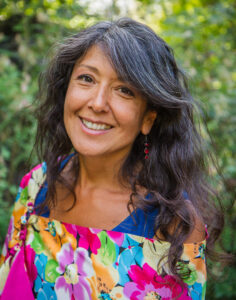
Proving it took some legwork, but thankfully Duran had nine months – thanks to a 2016-17 Fulbright-García Robles grant – to determine whether the former president of Mexico had access to Milton’s works in his formative years. And, in fact, he did.
Duran uncovered documentation proving that Milton’s works were in circulation at Juárez’s school when he was a child and teenager. And while Duran was conducting research for her upcoming book, "Milton and Hispano-América," an academic colleague also pointed her toward a speech by Fidel Castro, revealing another possible origin for Milton’s influence.
“Then you think, ‘Ah, Fidel Castro received legal education. So did Benito Juárez. So did José Martí,’ ” Duran said. “Then you start looking at the legal libraries instead of the literary libraries and, lo and behold, that’s where Milton is. So it was creating that network and figuring it all out. I feel like a little detective of the dead.”
As an English professor who specializes in archival research, Duran often needs access to rare, old works that are unavailable online. She went to Mexico looking for material that dated back to the Spanish Inquisition, and she found links to Shakespeare and Milton in locations that can only be accessed in person.
“I had to work from a hunch,” Duran said. “As it turns out, Mexico, in the city of Puebla, has the first circulating library in the Americas, the Biblioteca Palafoxiana. So I had to get to it, and I did find just a treasure trove of stuff.”
Duran’s Fulbright involvement continues even after her research excursion to Mexico. Starting in June 2018, she began serving a three-year stint as a Fulbright Specialist, which makes her available upon request to speak about the settling of the Americas as a subject-matter specialist.
That association has only strengthened Duran’s belief that the Fulbright program takes its mission seriously.
“My experience of it was they’re not kidding about really trying to promote intercountry human relationships,” she said. “They really fostered that.”
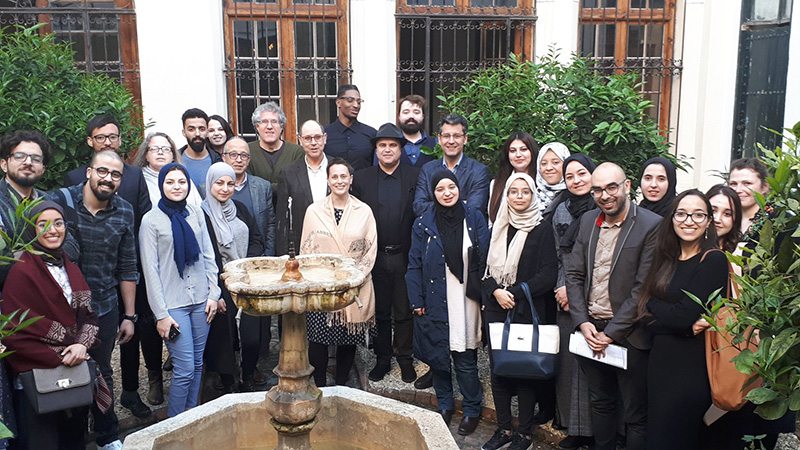
HISTORICAL PERSPECTIVE STACY HOLDEN, HISTORY
Stacy Holden has long counted Moroccan history and culture among her research interests.So when she decided to write a book about American novelist Edith Wharton and the experiences that produced her travel memoir "In Morocco," Holden knew she needed to return to the country where she spent her first Fulbright excursion 20 years ago.
“I traveled to Morocco in order to research Morocco during World War I, the very start of the colonial era,” said Holden, an associate professor of history. “I am using a trip by the American author Edith Wharton as a jumping-off point for looking at American engagement with French imperialism and colonialism in North Africa during the Great War.
“Wharton supported French imperialism, but other Americans did not. So, her travels in 1917 and subsequent travelogue are really an important way of understanding conversations at the time about U.S. policy in the Arab world.”
Holden traveled to Morocco this spring on a Fulbright flex grant, which will allow her to break up a six-month stay over multiple trips. After spending four months in Morocco in the spring, she plans to complete her research there next summer.
She said the country’s Fulbright office is connected at every Moroccan university, providing access to essential research sources.
“Having a Fulbright can really open doors for you,” Holden said. “If the director or assistant director advises you to contact someone, they will make time for you. It can be very helpful to have this Fulbright designation and work through this office.”
Her lengthy stay also allowed Holden to host seniors Scott Strait and Khalil Williams – with assistance from Purdue’s Associate Dean for Undergraduate Education and International Programs – when they visited in March to present alongside Moroccan students at a conference.
“(That was) another benefit of my long-term stay,” Holden said. “They presented research with their counterparts at Abdelmalek Essaadi University in Tetouan and traveled a bit throughout the country, to Tangier, Rabat, Fez, Meknes, and Volubulis. If I had a short-term grant focused exclusively on research, and not also on international exchange like the Fulbright, I would not have been able to facilitate their journey and their introduction to Morocco.”
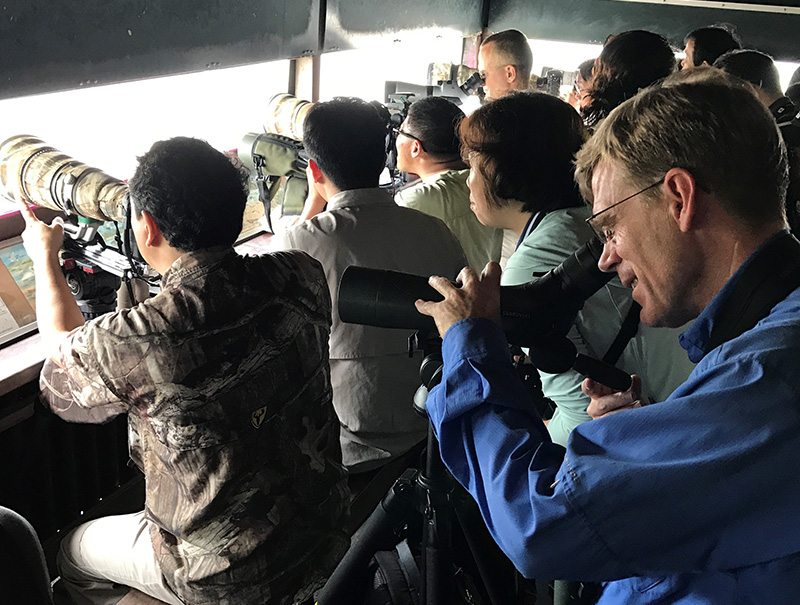
EXPANDING KNOWLEDGE FREDERICK ROWE DAVIS, HISTORY
Frederick Rowe Davis is an expert on the history of pesticide use in the United States. So when he spent the 2016-17 academic year at the Chinese University of Hong Kong on a Fulbright, he naturally wanted to learn about pesticide usage patterns and regulation in China.He discovered that many citizens of Hong Kong were so concerned about contamination that they preferred to purchase organic produce instead of produce grown in China.
“That was one striking issue, but also more specifically in my research, it was really striking to me that regulation of pesticides in China followed the regulation of pesticides in the United States on a somewhat-delayed time horizon,” said Davis, head of the Department of History. “For example, the U.S. banned DDT in 1972. China banned DDT in 1983. So I learned that the regulation of pesticides in China is an ongoing process.”
Because of Davis’ background researching and teaching about the history of science, the University asked him to incorporate that knowledge into his teaching curriculum in its emerging program in liberal studies. He was impressed by the way Hong Kong universities placed the liberal arts at the center of their educational mission when the opposite was all too often the case back home.
“For me, that was exciting because I’m very aware of the decline of liberal arts in the United States and the ways in which Purdue, through the Cornerstone program and other initiatives, is attempting to reverse that trend,” Davis said.
Another unexpected bonus of Davis’ stint in Hong Kong was the opportunity to indulge a personal interest. An avid bird watcher, Davis discovered that one of the world’s most remarkable wildlife refuges – Mai Po Nature Reserve – existed between Hong Kong and Shenzhen, China.
“Mai Po refuge attracts tens of thousands of shorebirds, including a remarkable diversity and number of birds,” Davis said. “So even though it was a lengthy trip from my flat in the New Territories, I tried to go visit Mai Po at least once a weekend to track the spectacular movement of birds through Hong Kong from all along the Asian-Pacific flyway.”
Between teaching, research, and attending conferences, Davis was able to visit a number of countries in the Cross-Straits region – including Hong Kong, Macau, Taiwan, and China – and came away with a better sense of the relationships between these nations and the U.S.
He also returned home with an appreciation for the connections that the Fulbright program allows participants to form.
“The Fulbright program created an instant network of past and present Fulbrighters,” he said. “The other Americans who were based in Hong Kong, but also the Hong Kong students and professors who spent time in the United States on the Fulbright program, it all became part of a larger network. Those interactions while I was there and since were a really great opportunity."
POETIC PURPOSES MARIANNE BORUCH, ENGLISH
Marianne Boruch has dedicated her professional life to creative expression. It seems appropriate, then, that she chose places that would stimulate her artistic sensibilities when selecting locations for her two Fulbright projects.The Professor Emeritus of English spent five months this spring – February through June – working as a Senior Fulbright Scholar in Australia at the University of Canberra. There, she observed the capital city’s plentiful wildlife, including kangaroos, wallabies, birds, and a personal favorite, the platypus, which she described as “the weirdest, most endearing animal on Earth.”
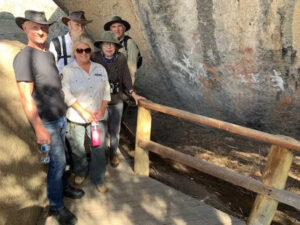
“From this experience, I hope to write a sequence of poems, a sort of neo-ancient medieval bestiary,” Boruch explained. “Of course Pliny got here first with his Naturalis Historia shortly before perishing in an open boat under fire and lava at Pompei. But history doesn’t always have to repeat itself in every detail.”
Boruch also spent six months in 2012 teaching and conducting research on a Fulbright excursion at the University of Edinburgh – an experience that helped her finish an acclaimed eighth collection of poems, "Cadaver, Speak."
Edinburgh, she said, is “home of one of the oldest, most important surgical museums in the world” – an valuable resource since the collection of poems offered ruminations on life from the perspective of cadavers she encountered on a fellowship spent with a medical school anatomy class.
“Just living in that haunted, beloved city was a non-stop delight. To hear English spoken in a whole new way made me think hard about my own use of the language,” Boruch said. “In Australia, the latter is certainly true, as well. If you manage to do something well, you hear, ‘Good on you!’ Or you wait for someone ‘to collect you,’ not pick you up at the corner of this or that street.”
In addition to completing the creative works by her Fulbright trips, celebrating these cultural differences is one of Boruch’s favorite aspects of the trips abroad. As she put it, the opportunities to “observe, question, take notes, write, have long conversations” with those in a foreign country allow participants to “traffic in the unknown and, in many cases, the unknowable.”
“It is a continual astonishment. A cabinet of wonders,” Boruch said. “And isn’t that what scholars and artists live for? The world both familiar and straight – and how we patiently learn to understand at least a part of that connection.”
LOCATION MATTERS WENDY KLINE, HISTORY
One truth about the writing process has become abundantly clear to Wendy Kline during her Fulbright experiences in the United Kingdom: There is no substitute for firsthand experience.Kline, the Dema G. Seelye Chair in the History of Medicine, could have covered R.D. Laing and his theories on LSD treatment in an upcoming book simply by conducting archival research. Instead, she went to the controversial Scottish psychiatrist’s hometown of Glasgow during a Fulbright trip in the fall of 2018 in search of insight that could only be gained through in-person interaction.
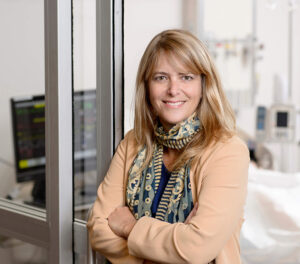
“I went to visit where he worked, where he was born. I talked to people about memories of him being there, and the same for this trip,” said Kline, who is on a second U.K. Fulbright trip this fall, now at the University of Birmingham. “I’ll be in the area, I’ll be talking to people. That will influence the way I write the book because it feels physically different to be in that space rather than just in the lab or the archive or something. I really appreciate that. I think it will make it a better book.”
Kline’s previous study of psychedelic research had mostly focused on U.S.-based efforts that navigated between dueling perceptions that the drug could be therapeutic versus notions that its use was a risky and hedonistic practice. As her research continued, she learned of similar experiments by psychiatrists in the U.K.
Her second Fulbright will allow her to learn even more about how attitudes toward LSD treatment evolved.
“I learned about this asylum called Powick Hospital where one particular psychiatrist created what was called the LSD block, where he housed several patients to experiment with LSD therapy,” Kline said. “It became extremely controversial, and there was a lawsuit in 2002, and nobody had really written about that aspect of it. The hospital is very close to Birmingham, where my fellowship is, and I’ve been put in touch with an archivist and a therapist who both know some people in the community who are still around and were involved that I could go interview.”
Perhaps she could have made those connections and conducted interviews without leaving West Lafayette, but Kline believes it would have been unlikely. Having a physical presence in the U.K. provided the crucial opportunity to network and explore, thereby strengthening her grasp on the subject matter.
“You have to put your foot in the door and see where it takes you, and you can’t do that if you’re thousands of miles away,” she said. “It’s not going to happen.”
UNLOCKING ACCESS LEIGH RAYMOND, POLITICAL SCIENCE
High-ranking political officials rarely make themselves available to just anyone seeking an interview. When Leigh Raymond spent the fall of 2018 researching Canada’s new carbon pricing policies, he understood that his Fulbright Canada Research Chair in the Sustainable Economy was what helped him gain access to those politicians in Ottawa.“I was trying to interview some people who were pretty high up in government and the Fulbright position was definitely helpful,” said Raymond, professor of political science. “It’s a program that is well respected.”
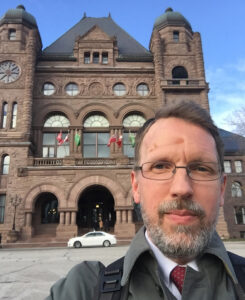
Raymond recently completed a book on the political and practical implications involved with putting a price on carbon emissions in the United States, but was not as familiar with the particulars of Canada’s policies when he arrived at the University of Ottawa last fall. Over the course of his four months there, he realized it was a perfect place to expand upon his domestic research.
“There’s a lot happening in Canada on this issue right now – a tremendous amount – including a federal election that in large part has already been very much about the federal government putting a carbon tax in place, which has gotten a lot of political controversy,” Raymond said.
Raymond was interested in studying Canada’s array of provincial carbon pricing programs, particularly the ambitious one in effect in Ontario. He spent the initial portion of his fellowship immersing himself in the policies, building a network of expert sources he could interview as his multiyear research continues.
Raymond views Canada as a test case for international efforts to efficiently and effectively cut greenhouse gas emissions. As a political scientist who studies environmental policy, he is particularly interested to see how the Canadian legal and judicial systems treat these policies moving forward.
“Canada is an important case right now,” he said. “I think the future of this kind of policy design globally, a lot is going to matter about how this goes in Canada in the next few years.”
Raymond admitted that a research subject can become exhausting for an author who has focused on it so intensively while completing a book, as was the case with his work related to carbon pricing. However, his Fulbright experience in Canada provided an opportunity to study the subject in a new context, which was reinvigorating.
“I have been kind of starting to get going on what’s next in terms of following up on my research on carbon pricing in the U.S., but this experience really jumpstarted that new research agenda,” Raymond said. “Talking to all these people about what had happened in Ontario, which actually turned out to be a pretty complicated and interesting story, was really exciting. It was a great way to get reengaged with these important research questions in a new political context.”
RESEARCH OPPORTUNITIES MARGARET TILLMAN, HISTORY
Margaret Tillman didn’t just use her 2017-18 Fulbright experience in Taiwan to finish her first book, she used it to start her second.She put the final touches on her well-received book "Raising China’s Revolutionaries: Modernizing Childhood for Cosmopolitan Nationalists and Liberated Comrades, 1920s-1950s," noting that the convenient timing made a difference in the publication’s quality.
“Definitely being on the Fulbright helped me to be able to devote time,” said Tillman, an associate professor in history. “It’s a much better book because I was on leave during this final process of revision.”
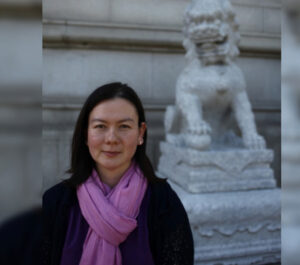
Tillman’s research for her second book examined the issues surrounding Chinese standardized testing culture dating back to the abolition of the civil service examination in 1905. It also focuses on the social science involved, including Sino-U.S. efforts to remove cultural biases from the tests.
“Testing culture is very pervasive in East Asian cultures, in cultures that were affected by the civil service exam. And we know this from our students who come to us with a lot of anxiety about testing,” Tillman said. “But the civil service examination was technically abolished in 1905. And so the question is, ‘Well, how does that testing culture continue?’ In a way, it’s a bad question because the civil service exam is for bureaucrats and what I’m looking at is the rise of normative, scientific, ‘objective’ exams for children.”
As a Purdue faculty member, Tillman has witnessed some of these anxieties from her own students. At Purdue, 3,313 Chinese students were enrolled in fall 2018 – by far the university’s largest international population – so the unintended consequences of testing culture are relevant here, too.
“Part of my motivation for writing the book, actually, is rooted in my experiences teaching here and responding to some of my students’ anxieties about not only testing, but also being quantitatively measured in ways that determine their future,” Tillman said.
Her 2017-18 Fulbright in Taiwan was Tillman’s third experience with the program – actually the fourth if you count the time she spent in China as a preschooler while her father completed a Fulbright there.
She credited Fulbright and other international programs like it for fostering relationships that build trust among nations. She found that to be especially true with Taiwan’s Fulbright organization and at Academia Sinica, her Taiwanese host institution.
“Academia Sinica is not a conventional university. It’s more like a research institution,” Tillman said. “It’s an academy with a deep historic tradition to the Republic of China. I would say it’s a wonderful place to do your research. They have so many resources, and the scholars there are extremely welcoming. And because they have such a concentration of scholarship in one place, that just makes it a really fertile place for cross-pollinization.
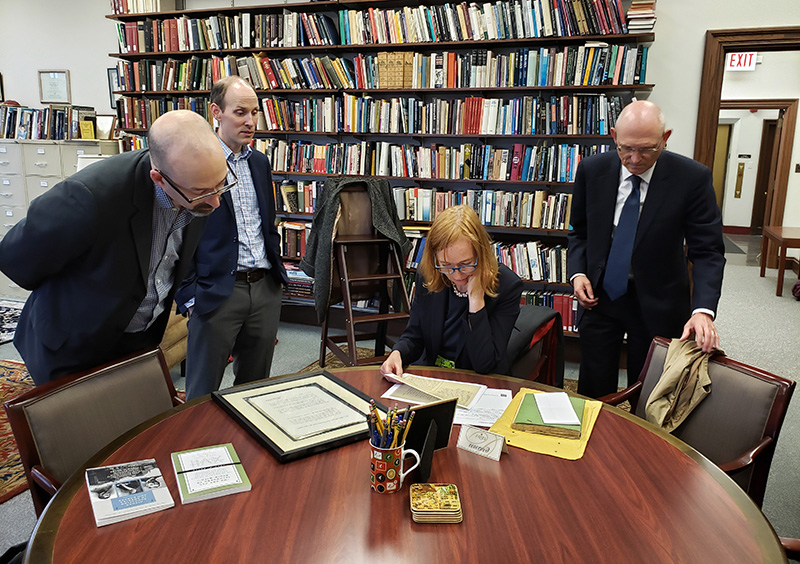
ONGOING IMPORTANCE JEFFREY TURCO, SCHOOL OF LANGUAGES AND CULTURES
One of the most appealing aspects of the Fulbright program is the opportunity it presents to experience other cultures. Three-time Fulbright grantee Jeffrey Turco understands this as well as anyone.“I regularly tell my students that study abroad is the single-most mind-expanding and life-altering endeavor they can undertake as part of their undergraduate career,” said Turco, associate professor of German in the School of Languages and Cultures. “This is no less true for faculty. Fulbright is ‘study abroad’ for the postgraduate mind.”
Turco was fresh out of college when he was awarded his first Fulbright grant, which allowed him to spend a full year in East Germany. He returned to Germany in 2013 on a three-week Fulbright program for American professors of German. In between those trips, he spent 2007 in Iceland as a Fulbright research grantee at the Árni Magnússon Institute for Icelandic Studies and the University of Iceland.
His research in Iceland led to a long article on Icelandic folklore that later became part of a book. He served as editor of "New Norse Studies: Essays on the Literature and Culture of Medieval Scandinavia," which published in Cornell’s "Islandica" series and led to his appointment as editor-in-chief of a new Cornell journal, also titled "New Norse Studies."
These experiences produced connections that Turco has maintained more than a decade after his Fulbright trip to Iceland ended.
“Last year, I was invited back to deliver a lecture at the National Library of Iceland on the Viking ‘discovery’ of New England – a wholly imaginary, but popular, notion in 19th-century American thought, which held sway over such figures as Longfellow, Emerson, and Thoreau,” Turco said.
He has also served as a diplomat of sorts. Turco was recently selected to meet with the German ambassador to the United States and the German consul general for the Midwest to discuss the value of educational collaborations like the Fulbright program.
“As a professor of German, it’s fascinating for me to be part of a history that began with Sen. Fulbright’s inspirational idea of using World War II surplus to fund the ‘promotion of international good will through the exchange of students in the fields of education, culture, and science,’ ” Turco said. “Fulbright’s beating of swords into plowshares is no less relevant today than in 1945.”